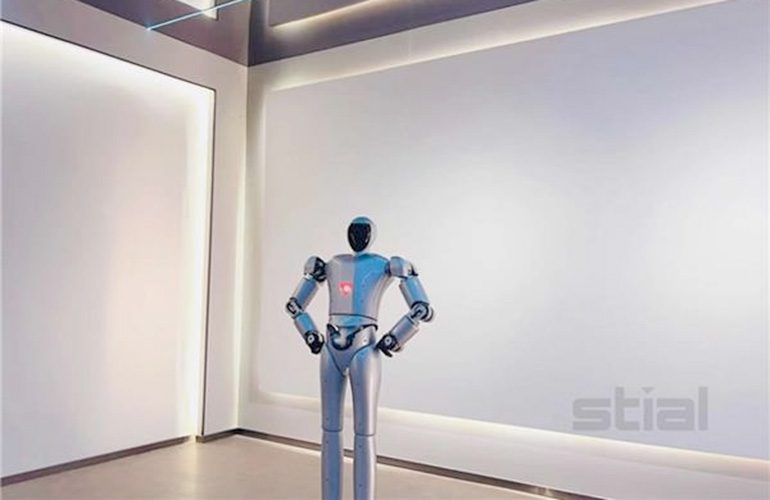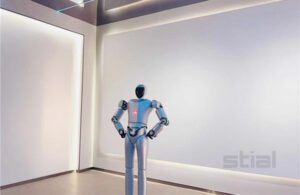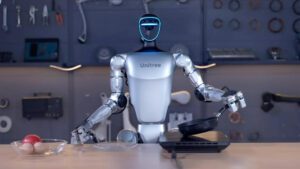Introduction
The robotics industry is entering an exciting new phase with the introduction of intelligent humanoid robots that can perform highly specialized tasks. Stial Technologies, a Toronto-based robotics company, has taken a significant leap forward by unveiling Stial Steven, a humanoid robot designed specifically for precision polishing applications.
This announcement follows Stial’s recent acquisition of STFcore (ZhongQing Technology), a leader in 6D force sensor technology. With this acquisition and the launch of Stial Steven, the company is set to revolutionize industrial polishing by integrating artificial intelligence, force control, multimodal sensing, and advanced robotics into a seamless solution.
Redefining Industrial Polishing with AI and Robotics
Traditional industrial polishing is a labor-intensive process that requires extreme precision. Many industries, from automotive manufacturing and aerospace to semiconductor electronics, rely on meticulous polishing for high-quality finishes. However, human workers often face repetitive strain injuries, and conventional robotic arms lack the adaptability to handle complex surfaces.
Enter Stial Steven, a humanoid robot that mimics human motion to perform high-precision polishing with unparalleled adaptability. Unlike standard robotic arms, Stial Steven leverages AI-driven learning and real-time force adjustments, ensuring consistent, high-quality results on intricate and curved surfaces.
“At Stial, we envision a future where AI-powered humanoid robots work alongside humans, taking over demanding and hazardous tasks while maintaining a human-like approach to craftsmanship,” said Hongbo Wang, Founder and CEO of Stial Technologies.
The Power of STFcore’s 6D Force Sensors
A key component of Stial Steven’s advanced polishing capability is the integration of STFcore’s 6D force sensors. These sensors provide:
- Real-time force monitoring to ensure optimal pressure application.
- Dynamic adjustments to polishing angles and trajectories, mimicking the precision of skilled human operators.
- Closed-loop feedback systems that adapt to variations in surface texture and curvature.
STFcore, founded in 2018, has been at the forefront of force feedback technology, competing with global leaders like Germany’s ME System and the U.S.-based ATI. With Stial’s acquisition, these high-performance force sensors will enhance the adaptive intelligence of humanoid robots, setting a new benchmark for industrial automation.
Stial Steven: The Next-Gen Polishing Robot
Stial Steven is designed for versatility, bringing a human-like approach to industrial tasks. Its key features include:
1. AI-Driven Precision Polishing
Stial’s proprietary NextBrain AI allows Steven to autonomously learn polishing techniques, analyze product details, and adjust force and motion in real time. This ensures the highest quality standards in polishing operations across diverse industries.
2. Humanoid Mobility for Enhanced Flexibility
Unlike traditional robotic polishing systems that remain fixed in place, Stial Steven features full humanoid mobility. It can reposition itself within a manufacturing facility, allowing it to work on different products and locations without requiring extensive reprogramming.
3. Multimodal Perception Technology
Stial Steven integrates vision, touch, and auditory sensors, enabling it to:
- Recognize and analyze surfaces before polishing begins.
- Adjust its force based on real-time feedback from its sensors.
- Detect and correct polishing inconsistencies dynamically.
4. Scalability and Industry Adaptation
With modular hardware and AI adaptability, Stial Steven is easily customizable for various high-precision industries. From aerospace turbine blades to luxury automotive components, the robot can be trained for specialized applications, reducing costs and improving efficiency for manufacturers.
Transforming Manufacturing Through Robotics
Stial Technologies’ unveiling of Stial Steven represents more than just a technological innovation—it signals a paradigm shift in industrial automation. By combining AI-driven learning, real-time force control, and multimodal perception, Stial is bringing human-like intelligence to robotics, paving the way for more adaptable, precise, and efficient manufacturing solutions.
As industries continue to seek automation solutions that balance efficiency with craftsmanship, humanoid robots like Stial Steven could redefine the future of industrial production. With the integration of STFcore’s advanced force sensors, Stial Technologies is positioning itself as a leader in AI-powered robotics for specialized applications.
What do you think about AI-powered humanoid robots in industrial settings? Could they replace human labor, or will they serve as intelligent collaborators? Share your thoughts in the comments!



